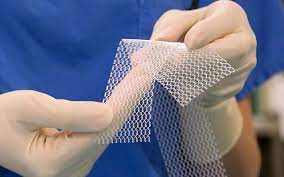For many years women have been calling for transvaginal tape (TVT), or TVT mesh, to be banned following reports of further health issues being caused after having the implants fitted. Between 2006 and 2016, it is believed around 100,000 women in the UK were given these implants. We’ve gathered our own data on the matter, and discuss this in more detail in the report below.
What are TVT mesh implants?
Vaginal mesh – or transvaginal tape (TVT) – is the name given to surgical mesh that is inserted into the vagina to help treat damaged muscle tissue. It amounts to a net-like fabric that can be attached to the walls of the vagina, acting as a scaffold to support the organs. The implants are most commonly used to treat pelvic organ prolapse and incontinence after childbirth or following a hysterectomy procedure. However, unfortunately, some implants can cut into the vagina – causing severe discomfort and infections.

Are TVT mesh implants still being used in England?
Currently, guidelines state that TVT mesh should not be used routinely due to its potentially severe consequences and the frequency of women suffering adverse effects. However, the use of TVT mesh is still permitted in certain scenarios, resulting in 15,000 women per year being fitted with potentially dangerous mesh.
Awareness of the procedure remains low, with just over a third (36%) of people agreeing they were aware of TVT mesh, falling to only 27% when asked if they knew what it was used for.
Censuswide survey results: Lime Solicitors
What complications can arise from having TVT mesh implants fitted?

Many women are reporting a range of issues from the use of vaginal mesh, including:
- Organ perforations
- Bleeding
- Chronic infections
- Sexual issues
- Recurrent UTIs
- Mobility issues
- Serious nerve damage
- Significant pelvic pain
- Fibromyalgia
- Incontinence
- Mesh extrusion
- Mesh erosion
Part or all of the device can be removed, but this becomes more difficult as time passes.
The issue of informed consent
It is the duty of every medical professional to explain the risks of vaginal mesh surgery, so patients can give informed consent. So, in cases where patients are not given this information, it would be classed as medical negligence.
Informed consent is obtained once your medical professional has provided you with all appropriate information – including the benefits, material risks and reasonable alternatives – to enable you to make a fully informed choice to either accept or refuse the treatment being recommended to you.
The decision must not be influenced by pressure from medical staff, friends or family.
Once made aware of the health implications, less than one in five women (18%) said they would allow their doctor to fit TVT mesh implants if recommended.
Censuswide survey results: Lime Solicitors
What else is being done about TVT mesh?
Baroness Julie Cumberledge issued a report in July 2020 after the government set up the Independent Medicines and Medical Devices Safety Review.
The report noted that women who had suffered mesh-related problems often did complain, but those worries were dismissed as ‘women’s problems’ – leaving victims traumatised, intimidated and confused.
The Baroness found a culture of denial by a disjointed and defensive healthcare system entrenched in institutional misogyny, which failed to listen to patients’ concerns. She applauded the women for their bravery, dignity and tenacity.
NHS England put an immediate stop to mesh operations after safety concerns were expressed.
Almost half of Brits (48%) believe the government should set-up women’s-only health centres to address health inequalities.
Censuswide survey results: Lime Solicitors
Should TVT mesh be banned?
Yes, we believe so and so do almost 50% of the British public. We have launched a petition calling for an outright ban on TVT mesh implants, which you can sign here.
A significant number of mesh devices have been removed from the market already, and we recommend that the recent NICE guidelines calling to avoid the use of this mesh is instead extended to a full ban.
The new Women’s Health Ambassador should place an outright ban on TVT mesh implants immediately, according to 48% of Brits.
Censuswide survey results: Lime Solicitors
Helping patients take legal action following negligent TVT mesh surgery
If you’ve had TVT mesh surgery and have developed ongoing health issues as a result of negligence during your treatment, you may be eligible to bring a claim for surgical negligence. We recommend you seek legal advice as soon as possible – our team of medical negligence solicitors have helped many patients take legal action following this surgery and will work with you to achieve the best possible outcome.
If you wish to bring a medical negligence claim for TVT mesh, Court proceedings need to be issued within three years of the date you become aware you were injured as a result of the mesh implant. However, the courts do have discretion on this. If you are unsure, we encourage you to start your claim as soon as you can. You can call us free on 0808 164 0808 or request a call back, and one of our team will call you.
We carry out many of our vaginal mesh claims and other medical negligence claims on a no win, no fee basis. For more information on the cost of a claim, please speak to one of our team.
[2,000 people were surveyed by Censuswide on behalf of Lime Solicitors]
